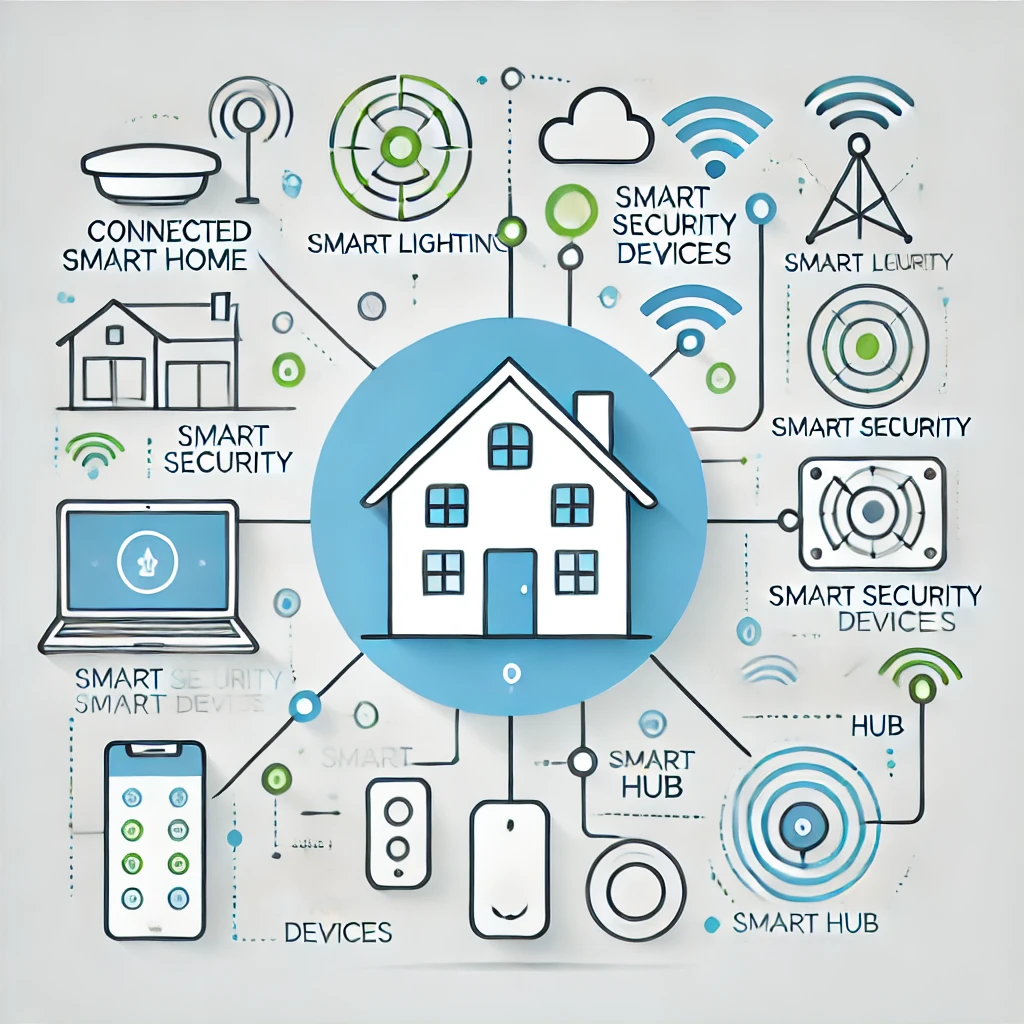How to Set Up a Smart Home in 5 Easy Steps
Setting up a smart home can seem daunting, but in 2024, it’s easier than ever. With the right devices and a step-by-step approach, you can create a connected and efficient smart home that enhances your lifestyle.
Step 1: Choose Your Smart Hub
The first step is choosing a central smart hub that will control all your devices. The Google Nest Hub Max or Amazon Echo are popular choices, offering seamless integration with smart lights, security systems, and more.
Explore Google Nest Hub Max deals here

Step 2: Automate Your Lighting
One of the easiest and most impactful ways to start your smart home journey is by automating your lighting. Philips Hue Smart Bulbs offer customizable lighting that can be controlled via an app or voice commands. You can also set schedules to ensure your lights turn on or off automatically.
Find Philips Hue Smart Bulbs here
Step 3: Secure Your Home
Home security is a critical part of any smart home setup. Devices like the Ring Video Doorbell Pro 2 allow you to monitor your front door remotely, while Arlo Security Cameras provide 24/7 video surveillance of your property.
Discover deals on Ring Video Doorbell Pro 2 and Arlo cameras here
Step 4: Control Your Climate
Managing your home’s climate is easy with a smart thermostat like Ecobee. These devices learn your preferences and adjust the temperature automatically, helping you save on energy bills while staying comfortable.
Check out Ecobee Smart Thermostat offers here
Step 5: Expand Your System
Once you’ve set up the basics, you can start adding more devices like smart speakers, connected appliances, and entertainment systems. These gadgets will make your smart home experience even more enjoyable and convenient.
Conclusion
Setting up a smart home in 2024 is easy and rewarding. By starting with the essentials and gradually expanding your system, you can create a home that is not only convenient but also secure and energy-efficient.
Affiliate Disclosure:
This article contains affiliate links, meaning I may earn a commission if you purchase through these links, at no extra cost to you. As an affiliate, I only recommend products that I personally use or believe will add value to my readers.
How to Set Up a Smart Home in 2024: A Step-by-Step Guide
Setting up a smart home can seem overwhelming at first, but with advancements in technology in 2024, it’s easier and more affordable than ever. Whether you’re a beginner looking to automate your home or a tech enthusiast expanding your smart devices, this step-by-step guide will help you get started with building a connected and efficient smart home.

Step 1: Choose Your Smart Hub
The foundation of any smart home is a central hub that controls all your devices. The two most popular smart hubs in 2024 are the Amazon Echo and Google Nest Hub Max. Both of these devices allow you to manage your smart home through voice commands, using Alexa or Google Assistant to control your lighting, security, and entertainment systems.
Your choice of hub will depend on the ecosystem you prefer. If you’re already using a lot of Google services (like Google Calendar, Gmail, or YouTube), the Google Nest Hub Max may be a better fit. On the other hand, Amazon Echo integrates well with Amazon services like Alexa skills and shopping.
Discover deals on Amazon Echo and Google Nest Hub Max
Step 2: Automate Your Lighting
Once your hub is set up, smart lighting is one of the easiest ways to begin your smart home journey. Philips Hue Smart Bulbs are a top choice for 2024, offering customizable brightness and color settings that you can control via your smartphone or voice commands.
You can also set schedules to automatically turn lights on or off at specific times or integrate them with motion sensors for added convenience. This not only makes your home more energy-efficient but also adds an element of security, as you can give the impression that someone is home, even when you’re away.
Check out Philips Hue Smart Bulbs offers here
Step 3: Install Smart Security Devices
Security is one of the key reasons homeowners invest in smart home technology. Devices like the Ring Video Doorbell and Arlo Pro 4 Security Camera provide 24/7 monitoring of your property. With real-time alerts sent directly to your phone and the ability to see and communicate with visitors remotely, these devices offer peace of mind.
In 2024, these systems have become more sophisticated, with color night vision and motion detection that reduces false alarms. Setting up a smart security system is as simple as mounting the cameras, connecting them to your Wi-Fi network, and syncing them with your smart hub.
Check out Ring Video Doorbell and Arlo Pro 4 Security Camera offers here
Step 4: Optimize Your Climate Control
A smart thermostat, like the Ecobee Smart Thermostat, is an essential part of any energy-efficient home. It allows you to control your heating and cooling systems remotely, ensuring that your home is always at the right temperature, whether you’re home or away.
What sets smart thermostats apart is their ability to learn your preferences and adjust automatically. For instance, the Ecobee thermostat can detect when you’re not home and switch to energy-saving mode, helping you save money on your utility bills. You can also create temperature schedules to align with your daily routine.
Check out Ecobee Smart Thermostat offers here
Step 5: Expand Your Smart Home System
Once you’ve set up the basics, you can expand your smart home with a variety of additional devices. These might include smart speakers like the Sonos One for a fully connected entertainment system, or smart appliances that allow you to control everything from your refrigerator to your coffee maker via your phone or voice assistant.
In 2024, smart home systems are highly customizable, and you can integrate new devices at any time to create a seamless, connected living environment.
Check out Sonos One offers here
Conclusion
Setting up a smart home in 2024 is simpler than ever, thanks to advancements in technology. By choosing the right smart hub, automating your lighting, installing security devices, optimizing your climate control, and expanding with additional devices, you can create a home that’s both convenient and energy-efficient. The key to success is starting small and building up your smart home system as your needs grow.
Affiliate Disclosure:
This article contains affiliate links, meaning I may earn a commission if you purchase through these links, at no extra cost to you. As an affiliate, I only recommend products that I personally use or believe will add value to my readers.
How to Set Up a Smart Security System in 2024
Setting up a smart security system in 2024 has become easier with the advancement of home automation technologies. Whether you’re protecting your home from intruders or monitoring packages, here’s a step-by-step guide to creating a secure home.

1. Choose Your Security Hub
Your smart security system starts with a central hub, such as the Amazon Echo Show or Google Nest Hub Max, which allows you to control cameras, lights, and alarms through voice commands and apps.
Find deals on Amazon Echo Show here
2. Install Smart Cameras
Smart cameras, like the Arlo Pro 4 or Ring Spotlight Cam, provide real-time video streaming and motion detection. They allow you to monitor your property remotely from your smartphone.
Get the best prices on Arlo Pro 4 here
3. Set Up Smart Locks
Installing a smart lock, such as the August Smart Lock Pro, gives you remote access to lock or unlock your doors via smartphone. You can even provide temporary access to family members or guests.
Explore deals on August Smart Lock Pro here
4. Integrate Motion Sensors
Motion sensors are an essential part of any smart security system. They detect movement in and around your home, sending instant alerts to your phone or triggering alarms.
See the latest deals on smart motion sensors
Affiliate Disclosure:
This article contains affiliate links, meaning I may earn a commission if you purchase through these links, at no extra cost to you. As an affiliate, I only recommend products that I personally use or believe will add value to my readers.
